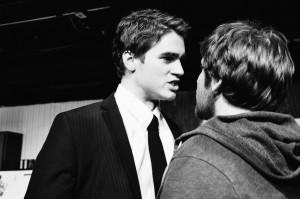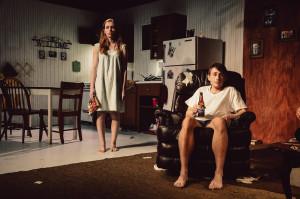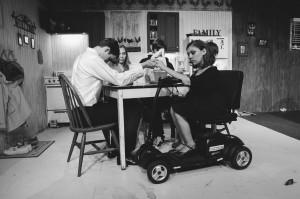
Family is usually associated with love; it is rarely conceptualized through a paradigm of power. However, that’s the unique perspective on the familial unit that the newest Nomadic/Mask & Bauble co-production, “Killer Joe,” provides. By adopting this focal point of power as an accepted familial reality, the play is able to freely explore intersecting themes such as justice, agency, sexuality and class relations, all while staying in the “comfort” of the home.
The play revolves around the Smiths, a Dallas-based family faced with the tough choices and experiences brought on by poverty. Chris, played by Connor Ross (COL ’16), falls into debt with threatening individuals and finds himself desperate for cash. He hopes to convince his father, Ansel, played by Wendell Krebs (COL ’15), to help with his newest moneymaking scheme: to hire a contract killer named Killer Joe Cooper, played by Conor Canning (COL ’16), in order to kill his mother for the money on her life insurance policy. To clarify, Chris’ mother is not Ansel’s wife; he is remarried to Sharla, who is played by Nora Genster (SFS ’16). However, Killer Joe requires upfront payment, which Chris and his father don’t have — so, he demands Chris’ sister Dottie, played by Emily Lett (COL ’17), as a “retainer” until the money is ready.
The entire concept of this screenplay is obviously terrifying. But what may be scariest is just how relatable it still is. Audiences have been attracted to Tracy Letts’ “Killer Joe” script since 1993, when he wrote the original, to 2011 when it was turned into a feature film starring Matthew McConaughey and even today at Georgetown. The reason for this persistent interest in such a tantalizing family drama appears to be the public’s recognition that “Killer Joe” exacerbates the reality of a family dynamic, but it’s deeply rooted in some truths.
This approach is established through the production choices made, as noted by Andrew Walker (SFS ’16), the play’s director. “A lot of our sound and lights choices allow the show ascend into hyperrealism, magnifying the severity of what is happening” he said.
The media often portrays children that wish their parents were dead, deadbeat dads who do nothing but watch TV all day and women cheating on their husbands in the hopes of running away with their boyfriends. These cliche tropes usually portray subtle emotions. “Killer Joe” puts the spotlight on these little things and take them to an extreme. It forces us to ask the question of what might happen if we ever gave in to those short-lived sparks of anger felt toward our family. This is not an easy, nor a safe, task — but Nomadic and Mask & Bauble approach it with precisely as much gutsiness as needed.
“Killer Joe,” both the individual character and the show as a whole, thrives on constant tension. This tension is comparable to the tension at Thanksgiving when an aunt and uncle start to fight. Cooper enters the Smith family scene and he makes use of that tension to establish his own power. In forming a fancy for Dottie, Killer Joe resorts to force as a mechanism for his entrance into the family. The two characters are almost always far apart on stage sharing curt, awkward responses. Ironically, it is when they are physically closest to each other that the scene feels most perverse and intuitively wrong.

Killer Joe’s forceful nature, though, is accentuated through a few specific choices made that establish him as more powerful than the Smith family. For one, he wears a perfectly fitted, tight suit, while the rest of the characters are often in more raggedy clothing. He creates a fake aura of professionalism with his wardrobe and his penchant for twisted hospitality and manners.
Even more so an indication of Joe’s difference, his wealthy status as a successful hit man differentiates him from the Smith’s. The family’s trailer park home is presented in a stereotypical hick-like fashion — that is, an old pizza box and tattered furniture grace the set since the very beginning. The set has all of things that a ‘home’ is perceived as having, but none of those things are in good condition — just like the family and their relationships. Killer Joe and his clean suit are nothing like the Smiths — yet he continues to take from and degrade this family.
Not a single member of the cast disappoints in “Killer Joe,” though some stand out more than others. In particular, Wendell Krebs (COL ’15), perfectly exudes the passive, enabling, almost-slavish existence expected from Ansel when faced with a man like Killer Joe breaking up his family. Nora Genster (SFS ’16) is also great to watch in this production as she portrays the deceptive and manipulative Sharla.
The choice to cast Genster is noteworthy not only for her ability but also because she has a disability. The way in which the performance incorporates her electric chair is interesting to note as the play progresses. This incorporation was essential and purposeful. “Commentary on disability is an important part of our production. People often think about it in isolation, but our show contextualizes disability into how it relates to gender, sexuality and class” Walker wrote.
“Killer Joe” is not for the faint of heart. The over-the-top extremism that it presents in this family’s life forces an audience to feel uneasy, in particular because the play is a dark comedy dealing with sensitive issues. The performance is preceded by a stern trigger warning and guidance to exit the theater. However, the fascinating thing about “Killer Joe” is that its specific humor and style is one in which the scenes that may cause some to squirm in fear and terror, will cause others to abruptly laugh at the show’s sensible awkwardness.

There are two things that are essential when coming to see “Killer Joe.” The first is that an open mind is crucial, as the hyper-realistic style takes some adjustment. The other is that viewers ought to take the pre-showing trigger warning seriously as the performance does deal with issues of sexual abuse and other threatening themes.
Though one has to be careful when watching, this Georgetown production is an ambitious one, and it is also one which is definitively worth the experience as it forces us into grappling with uncomfortable, but important, questions in a very direct manner.
“Killer Joe” will be showing from March 25th to 27th at 8 p.m. and on March 28th at 2 p.m. and 8 p.m. at the Walsh Black Box Theatre. Tickets cost $10 per student and $12 for general admission; they can be purchased at the Davis Performing Arts Center in person or online at performingarts.georgetown.edu/boxoffice.



















